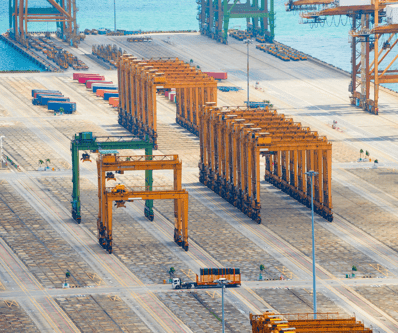The Future of Freight: 3 Trends Affecting Logistics Brokers
Freight/Shipping Trends | Industry News | Business Advice | Technology | Logistics | Transportation | Freight Broker
Freight brokers are a vital piece of the supply chain, connecting shippers and carriers to move goods in a timely and cost-efficient manner. According to industry projections, the US freight brokerage market is expected to grow at a compound annual growth rate of 7.7% over the forecast period, reaching a value of $15.3 billion this year.
The transportation industry is constantly evolving, with several factors influencing changes in trucking, retail, and freight brokerage. In this blog post, we'll look at the current trends affecting the industry.
Overview of the US Freight Brokerage Market
 The US freight industry is currently experiencing a supply market, where there are more trucks and drivers based on weakened consumer demand. A combination of contributing factors, including rising interest rates, have curbed consumer and business spending, putting pressure on the volume moving through US truckload markets.
The US freight industry is currently experiencing a supply market, where there are more trucks and drivers based on weakened consumer demand. A combination of contributing factors, including rising interest rates, have curbed consumer and business spending, putting pressure on the volume moving through US truckload markets.
The US freight market itself is a mix of larger regional and global companies and smaller local businesses. The top 8 to 10 logistics companies account for over a third of the total gross revenues. Newcomers such as Uber Freight and Convoy are aiming to increase their market share by providing transparency in pricing, online load boards, and freight marketplaces through mobile apps. The Trucking-as-a-Service (TaaS) model is also predicted to increase significantly.
Advanced technologies such as artificial intelligence and machine learning are enhancing efficiency and accuracy in the industry. These technologies are employed for automating tasks like load matching, carrier selection, and shipment tracking, allowing brokers to offer faster and more precise services. Integrating these technologies has also increased profitability for freight brokers, as they can operate with less manual intervention and lower costs.
Impact of Technology on the Market
The use of technology in the transportation sector has highlighted the significance of digital integration. Companies like Loadsmart and Transfix use algorithms to match carriers and loads based on several factors, such as origin, destination, price, commodity type, and timing. Digital integration can help prevent delays and issues that may arise during shipment. Many businesses, both new and established, offer load matching and real-time pricing. Armstrong partners with Parade to book freight with best-fit carriers and automate load bookings on high-volume lanes.

Telematics is another technology driving the industry, allowing freight brokers to solve more complex problems. It was initially introduced to locate freight. However, visibility solution providers have installed several apps and devices on trucks, with more advanced analytics tools built on top of the data streams. The data provided enables 3PLs to help shippers control costs while optimizing their shipment schedules and helps carriers to utilize their assets more efficiently.
Data analytics is also being used to gain in-depth insights into consumer behavior and preferences, optimize freight transportation routes, and reduce costs. With the help of data analytics, freight brokers can make more informed decisions regarding which carriers to use, routes to take, and how to optimize their operations for maximum efficiency and profitability.
Dependency on the US Trucking Sector
Trucking is the primary mode of transport for most imports arriving at the West Coast ports of Oakland, Long Beach, and Los Angeles. Overland freight movement in the United States is mainly handled by trucks. While rail transportation used to be a popular alternative, it has recently fallen out of favor due to its inability to accommodate smaller loads as effectively as trucks.
 The United States is the second-largest e-commerce market globally after China. It has grown rapidly in recent years and is expected to increase between 13% and 16% in the next five years. As e-commerce sales increase, so does the demand for faster order fulfillment, resulting in more frequent smaller shipments.
The United States is the second-largest e-commerce market globally after China. It has grown rapidly in recent years and is expected to increase between 13% and 16% in the next five years. As e-commerce sales increase, so does the demand for faster order fulfillment, resulting in more frequent smaller shipments.
Large retailers traditionally received products at regional distribution centers before transferring inventory to brick-and-mortar stores. While products are still housed at regional distribution centers, many items are shipped on demand to homes. Full truckload shipments are not possible when distribution centers must store a large number of SKUs in a small space. Many shippers are turning to LTL services to consolidate their freight, keeping their costs low.
Sustainability and Environmental Responsibility
Environmental responsibility is a growing concern; many companies are looking for ways to reduce their carbon footprint and operate more sustainably. Freight brokers are now offering eco-friendly shipping options and working with carriers who prioritize sustainability in their operations. For instance, Armstrong is a SmartWay Logistics Company Partner; the data the EPA provides through this program allows us to assess the environmental footprint of our carrier base and improve efficiency. This trend is expected to continue as more companies seek environmentally responsible partners.

Many freight brokers are beginning to integrate sustainability practices into their own operations. They may use digital technologies to reduce the amount of paper used in shipping documents or implement energy-efficient practices in their warehouses and offices.
The trend toward sustainability is not only driven by environmental concerns but also by consumer demand. As consumers increasingly prioritize ethical business practices when making purchasing decisions, companies are recognizing the importance of incorporating sustainability into their operations to remain competitive.
Overall, the focus on environmental responsibility is expected to be a significant trend in the years to come as companies and consumers continue to become increasingly conscious of their impact on the environment.
The Future of Freight: Embracing Change and Innovation
The freight brokerage industry is poised for significant growth and change in the coming years as new technologies, changing customer preferences, and evolving market conditions continue to shape the landscape. To succeed in this dynamic industry, freight brokers must stay ahead of the curve and invest in technologies and strategies that help them to operate more efficiently, reduce costs, and meet the changing needs of their customers. By embracing these trends and staying on top of the latest industry developments, freight brokers can position themselves for long-term success.
About Taylor Borum
Taylor joined Armstrong in 2021, serving as the team's Marketing Coordinator. A native of North Carolina, she moved to Charlotte in 2018 after graduating from Appalachian State University with her bachelor’s in Communication Studies. She's a passionate writer, having curated a diverse range of blog posts, articles, press releases, feature stories, webpage copy, social media posts, and more.



